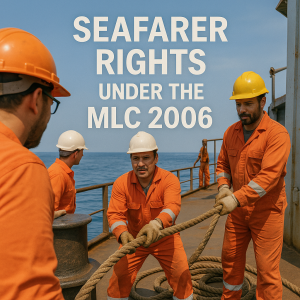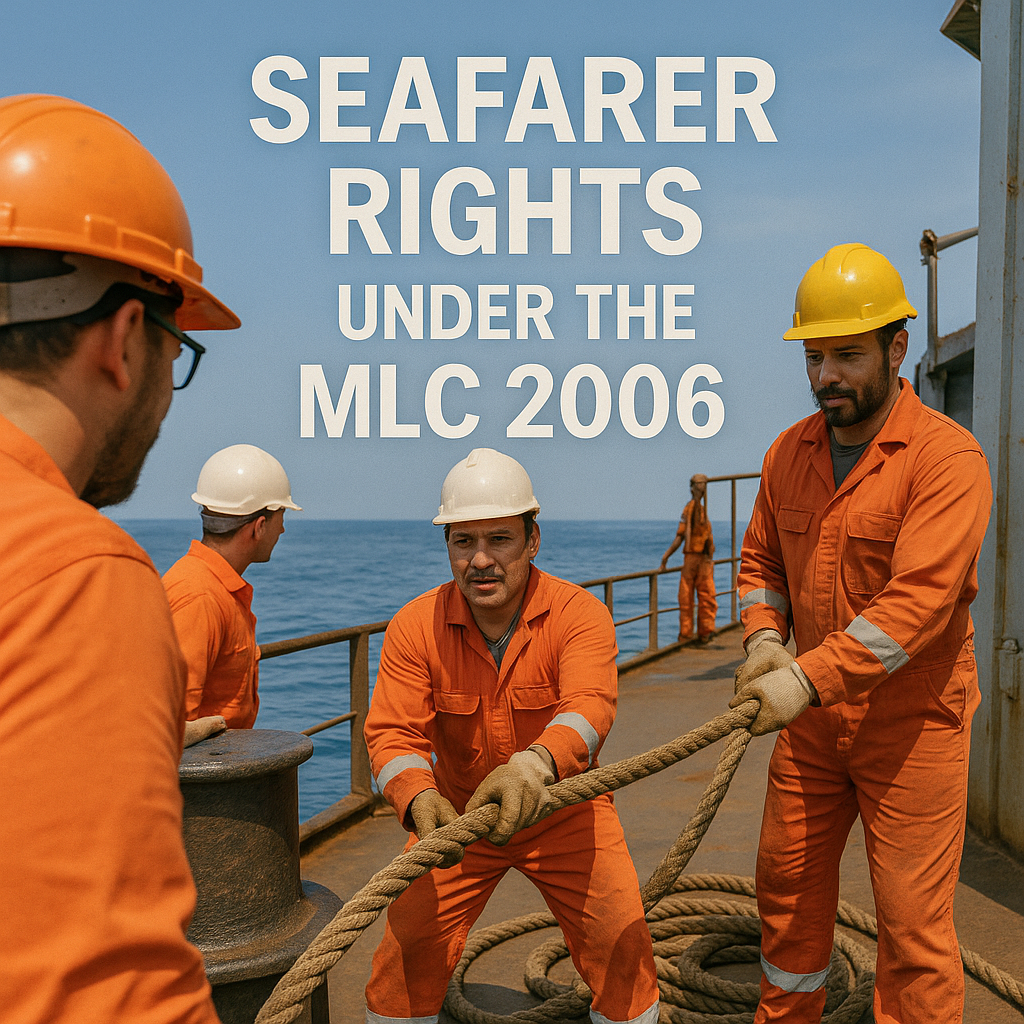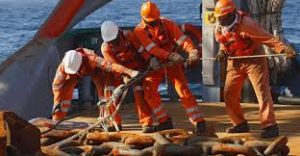Discover the top 7 seafarer rights guaranteed by the Maritime Labour Convention 2006. Learn how these protections shape safety, fair treatment, and wellbeing at sea in this comprehensive guide.
Why Seafarer Rights Matter at Sea ?
Imagine being thousands of miles from home, working long hours in challenging conditions with limited communication—and no guarantee you’ll return safely. For the more than 1.5 million seafarers worldwide, this is reality. The Maritime Labour Convention (MLC) 2006, often called the “Seafarers’ Bill of Rights,” has transformed this landscape by setting global minimum standards. Since coming into force in 2013, it ensures decent work, fair treatment, and safety for nearly 90% of the global fleet
This article explores the top seven fundamental rights that enable seafarers to work with dignity and protection—from safe conditions to prompt repatriation. We’ll use real-world examples, IMO data, and research to illustrate why these rights are pivotal for a fair and thriving maritime industry.

Understanding the MLC 2006 and Its Global Reach
The MLC 2006 consolidates over 60 earlier ILO conventions into a unified charter covering five areas: working conditions, employment terms, accommodation, health and welfare, and enforcement . With 108 ratifying countries as of mid-2024, it forms the fourth pillar of maritime regulation alongside SOLAS, STCW, and MARPOL
It’s unique: addressing the human side of shipping globally, closing gaps left by flag and port state laws. That’s why it has been both praised and critiqued—but most importantly, it holds violators accountable and empowers seafarers worldwide.
Safe and Secure Workplace
Seafarers have the right to work in a safe environment with standardized safety protocols and facilities This includes measures from fire safety to secure gangways and functional lifesaving equipment.
Case in point: After several PSC inspections flagged unsafe lifeboat access points, one major cruise operator revamped its emergency lighting and access ladders—reducing fire and abandon-ship risks significantly.
Fair Terms of Employment
Every seafarer deserves a clear, enforceable employment agreement in their working language. Contracts must specify wages, rest hours, leave, repatriation, and more .
Real-world example: In 2021, a Panamanian-flag cargo ship underwent Paris MoU inspection. Crew contracts lacked clear details on overtime pay, leading to deficiencies and remediation orders.
Decent Living and Working Conditions
The MLC mandates acceptable accommodation, food, and recreational facilities onboard—supporting wellbeing beyond work
Analogy: Just as a long-haul driver needs rest stops, seafarers need proper cabins, gyms, and mess facilities to maintain morale and alertness.
However, studies show issues remain. A 2021 pilot survey found only 56% of crew satisfied with onboard food—showing room for improvement .
Health Protection, Medical Care, and Welfare
Seafarers must have access to medical care, insurance, and sick pay . Under MLC, employers must cover medical costs at sea and ashore at no expense to the crew.
Since the 2014 amendments, seafarers also have financial protection in case of abandonment, a vital safety net. Over 97 cases of abandonment were reported between 2017–2018
Freedom of Association and Collective Bargaining
MLC guarantees the right to join unions and negotiate collectively . This empowers seafarers to advocate for better conditions and hold employers accountable.
Suppressing these rights would violate fundamental ILO principles. Where enforced, unions like ITF regularly defend hundreds of seafarers pursuing wage or labour issues.
Repatriation and the Right to Leave
When a contract ends, a ship is lost, or an employer defaults, seafarers must be repatriated at no cost . During COVID-19, this provision gained attention as crews were stranded aboard—highlighting the right’s vital role.
IMO/ILO monitoring seen hundreds of repatriation cases between 2020–2022, underscoring gaps in emergency crew-change protocols .
Compliance and Enforcement
Seafarers benefit from a robust inspection regime: flag states provide Maritime Labour Certificates, while PSC teams inspect vessels under nine MoUs
The certificate is only issued if compliance is up to par—and deficiencies may lead to detention. Between 2013–2017, PSC inspections revealed a downward trend in living-condition deficiencies, marking improved onboard standards
Real-World Impact and Case Studies
Denmark Pilot Study (2018):
A survey of Danish mariners found mixed reviews: 43 % saw improvements post-MLC, but 27 % felt no difference. Concerns remained on paperwork burdens, rest hours, food quality, and fatigue.
Abandonment Cases (2017–2018):
Ninety-seven cases were reported, some lasting over 32 months, prompting IMO/ILO action on financial security and crew support .
FAQ
Q1: Who does MLC protect?
All seafarers aged 16+ on vessels ≥200 GT or on international voyages.
Q2: What happens if employers violate MLC rights?
Port state inspectors can detain vessels, demand corrections, even prosecute owners under national laws.
Q3: Does MLC ensure fair pay?
Yes. Seafarers must be paid at least monthly, with wage payments documented and transferable home .
Q4: Can seafarers refuse unsafe voyages?
They should report safety concerns through internal mechanisms—and may refuse orders that endanger health.
Q5: How are medical services managed onboard?
Ships must have a medical chest, a trained first-aid provider, and access to telemedical support ashore .
Conclusion: A Human-Centric Shift in Maritime Law
The MLC 2006 represents a transformational shift: from viewing seafarers as interchangeable labour to protecting individuals with rights at sea. These seven fundamental rights—spanning safety, fair pay, health, repatriation, food, rest, and collective voice—anchor a more humane maritime industry.
Yet, as studies and case reports show, implementation gaps persist—from food quality to abandonment prevention. The Convention remains a living document, evolving through amendments, port inspections, and real-world feedback.
For seafarers, these rights mean more than compliance—they ensure dignity, safety, and a sense of home, even when they are far from shores.
References
-
ILO. (n.d.). Maritime Labour Convention, 2006 (C186)
-
ITF Seafarers. (n.d.). Your rights under the MLC
-
IMO. (2022). Milestone ratifications of MLC (100th) imo.org
-
Fotteler, M. L., et al. (2020). PSC stats on MLC impact
-
University of Southern Denmark. (2018). Seafarers’ views pilot study researchgate.net
-
IMO/ILO. (n.d.). Abandonment incidents database imo.org
-
Nautilus Int. (n.d.). Seafarers’ Bill of Rights guide nautilusint.org



Less focus of attention of IMO, while safety and environment protection are top priority for this organisation